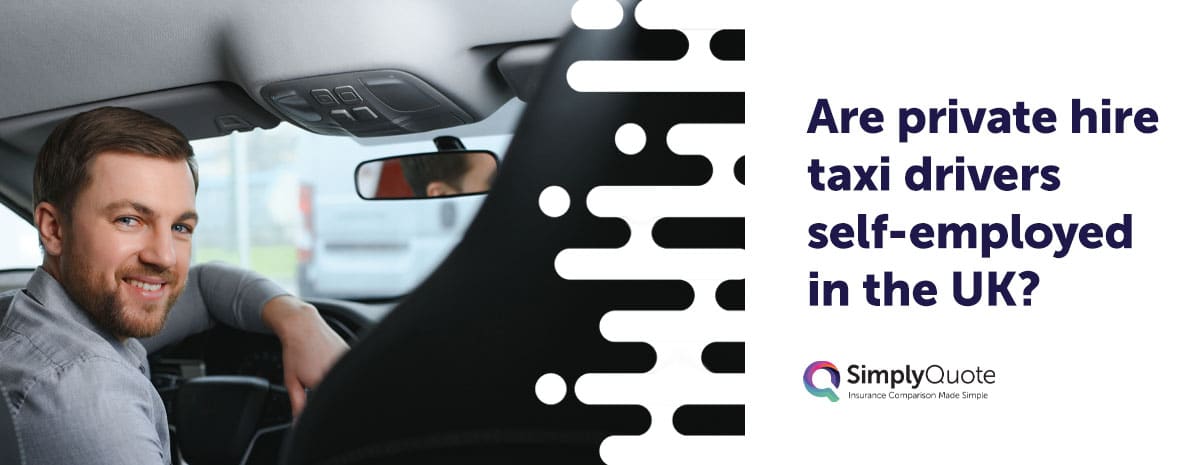Are private hire taxi drivers self-employed in the UK?
Yes, most private hire drivers in the UK are considered self-employed, whether they’re driving a black cab, using a personal vehicle or working for a ride-hailing company like Uber. This applies to freelance, part-time, and full-time drivers alike.
In fact, according to the Transport of London – the regulatory body for taxi and private hire services – all London cabbies are classified as self-employed drivers.
But what does it really mean to be self-employed? What financial obligations come with this status? What are the benefits of operating private hire vehicles (PHVs) and how do you become a private hire driver in Great Britain?
Luckily, this guide answers all of the above – and more.

What does self-employment mean for private hire taxi drivers?
Let’s take a closer look at what it means to be a self-employed PHV operator:
Employment status
Self-employed taxi drivers work for themselves, which means they don’t have a boss or line manager to report to. This is great, as you can set your own working hours and tax fares, and control your business’s decision-making. However, it also means you lose the luxury of paid time off and all financial obligations fall solely on your shoulders.
Financial obligations
You’re responsible for all financial aspects of your taxi company when you work for yourself, from fuel costs and Vehicle Excise Duty to income tax and more.
Here’s the breakdown:
- Vehicle finance/repayments
- Vehicle maintenance
- Fuel costs – £70 (petrol) to £82 (diesel) per tank
- Taxi insurance – averaging around £1,700 annually
- Licensing and registration (including MOT certification) – £100 to £500
- Booking app subscriptions
- Mobile phone contracts
- Office expenses – rent, utilities, internet, etc.
- Branding such as marketing materials and advertisements
- Taxi membership fees such as the Royal Automobile Club (RAC) and AA
- National Insurance contributions – when annual earnings exceed £6,475
- Self-assessment tax returns/corporation tax
- Vehicle Excise Duty (VHD)
Tax
Like most people in the UK, self-employed drivers also need to pay tax. The amount of tax you are liable to pay is based on how much you earn. Here’s a quick breakdown:
| Tax Band | Income Range | Tax Rate |
|---|---|---|
| Personal allowance | Up to £12,570 | 0% |
| Basic rate | £12,571 – £50,270 | 20% |
| Higher rate | £50,271 – £125,140 | 40% |
| Additional rate | Over £125,140 | 45% |
All self-employed drivers must register with the HM Revenue and Customs (HMRC) and complete a self-assessment tax return. This involves reporting all income and allowable expenses for the tax year, which runs from 6 April to 5 April the following year.
You must submit your tax return online by 31 January, following the end of the tax year. Paper tax return submissions are due by 31 October of the same tax year. Failure to do so will result in an immediate £100 penalty.
All taxi drivers in England and Wales are also required to submit a tax check. Registration for corporation tax only applies to large-scale taxi companies.
To claim tax relief for your private taxi services, a self-assessment tax return must be lodged prior. A few tax relief examples include:
- Fuel costs
- Vehicle repairs and maintenance
- Parking fees
- Taxi insurance
- Mileage
Bonus read: What expenses can a taxi driver claim?
Legalities
All licensed taxi operators, including private hire drivers, need:
- Valid UK/EU driver’s licence
- Private hire operators’ licence
It’s against the law to accept cash for hire and reward purposes (i.e. money from paying customers) without having a valid taxi licence. If caught, you may face a hefty fine, having your taxi licence revoked, insurance cancelled, and possible jail time.
Note: You also need to register your taxi company with the relevant authorities (sole trader, partnership, etc.).
Insurance
UK law stipulates that all motorists need the appropriate car insurance to drive on the road – and private hire cab drivers are no different. At the very least, you need third-party-only (TPO) cover – a type of public liability insurance – which protects you in the event you injure a member of the general public (or damage their property) when on duty.
A few variations of private hire taxi insurance offered by insurance companies include:
- PCO
- Uber
- Minicab
- Rideshare
- Private hire
- Hire and reward
If you’re using your personal car to transport passengers, you’ll also need valid social, domestic and pleasure (SD&P) insurance which covers you during off-duty driving. This is generally included in comprehensive taxi insurance policies.
Additionally, should you start your own private hire taxi business and need to hire drivers, you must have employers’ liability insurance by law. This protects you in the event an employee makes a claim against you for injuries sustained while at work. If you own a fleet of taxi vehicles, it’s best to opt for fleet insurance cover.
Compare taxi insurance quotes with SimplyQuote’s 100% free, online comparison tool today!
Pro tip: Professional indemnity insurance is not required but is a nice-to-have option if someone were to sue you for your professional services.
Looking for cheap taxi insurance? Get your quote today!
Get QuotesWhat are the benefits of being a self-employed taxi driver?
There are many significant upsides to being a self-employed taxi driver in the UK, from being your own boss to having control of your earnings and more.
Here’s a quick breakdown:
- Flexible hours
- Be your own boss
- Have control over your earnings
- A relatively easy business to start
- Able to explore your city and meet new people
- Have the ability to work for multiple platforms (i.e. gig drivers)
- Set your own hours, taxi fares and company procedures
Bonus read: Is it worth being a UK taxi driver?
How to become a private hire taxi driver in the UK?
It’s relatively straightforward to be a self-employed taxi driver in the UK and it is far cheaper to get this type of business off the ground than other entrepreneurial ventures.
Here’s a basic rundown of what you’ll need to become a private hire cabbie:
- Valid UK/EU driving licence
- Private hire operator licence
- A clean driving record
- Criminal background clearance
- Be deemed medically fit to drive by a doctor
- Private hire vehicle which adheres to Euro 6 standards
- Private hire taxi insurance
- Pass “The Knowledge” test – applicable to London drivers
- Good maths skills and business savviness
- Good interpersonal and communication skills
- A love for driving
Bonus reads:
Final thoughts
Most taxi drivers in the private hire sector are self-employed in the UK. This means they are in control of their working hours and earning potential as well as all tax and legal obligations. Being a private hire driver has many benefits and starting up your own taxi business is a relatively straightforward process.
Be sure to find the best taxi insurance quotes with SimplyQuote’s 100% free, online comparison tool today – the UK’s leading insurance comparison company for private hire drivers!
Frequently Asked Questions
A private hire driver is a taxi driver who carries passengers who book transport services through a ride-hailing app or pre-booked system like Uber, Ola, or Bolt. The self-employed part means they work for themselves, can set their own hours, and choose where and when they want to work.
Most times, private hire services are cheaper than black cabs. This is because private cabbies can set their own taxi fares, whereas black cabs’ (i.e. public hire taxis) prices are monitored and controlled by local authorities. For instance, the Transport of London (TfL) controls public hire taxi fares in London.
Not exactly. While Uber drivers are ‘self-employed’ in the sense that they can pick and choose their working hours, the UK Supreme Court ruled in 2021 that Uber drivers are in fact workers/employees. This means they are entitled to paid holidays and sick days as per employment law.
Yes, those in the rideshare business are self-employed taxi drivers because they use their personal vehicle to transport passengers from A to B. “Rideshare” is a typical American term that means the same as private hire driving in the UK.
84% of taxi and private hire vehicles (PHVs) were classed as self-employed drivers in 2023 – an 8% increase from 2010 as per government statistics.
